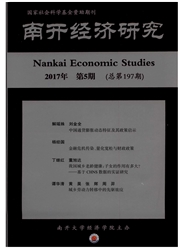

 中文摘要:
中文摘要:
本文从专业化分工和创新视角出发,尝试在理论上探讨生产者服务出口贸易影响生产率增长的作用机制,在此基础上采用OECD国家1987-2007年面板数据和计量经济模型进行相应的实证检验。结果表明:生产者服务出口贸易对生产率增长的影响具有不确定性,且对劳动生产率和全要素生产率增长的影响存在明显差异;单纯的生产者服务出口贸易专业化分工能促进劳动生产率增长,但不利于促进全要素生产率增长,仅按照传统的比较优势原理发展生产者服务出口贸易很可能会陷入“扩张陷阱”;服务部门异质性使得专业化分工与创新之间存在很强的互补效应,在该互补效应的影响下,生产者服务出口贸易能显著促进劳动生产率和全要素生产率增长,从而有效解决服务部门的“鲍莫尔成本病”。上述结果对中国的政策启示在于,今后应进一步深化生产者服务贸易领域的市场化改革,推动地区专业化分工和协作,重点加大生产者服务知识和技术开发投入力度,增强创新能力,为优化服务贸易结构和扩大生产者服务出口贸易外溢效应提供支撑。
 英文摘要:
英文摘要:
This paper attempts to explore how export trade of producer service affects productivity growth theoretically from perspective of specialization and innovation. Then empirical tests are made with panel data of OECD countries from 1987 to 2007 and econometric model. The results show that the effects of export trade of producer service on productivity growth is uncertain and significantly different between labor productivity growth and total factor productivity growth. Simple specialization of producer service trade can promote labor productivity growth, but not total factor productivity growth. This means the development of export trade of producer service is likely to fall into expansion trap if it is only based on traditional principle of comparative advantage. The heterogeneity of service sector makes it possible to generate strong comple- mentary effects between specialization and innovation. Thus export trade of producer service could significantly contribute to the growth of labor productivity and total factor productivity growth, which is able to effectively solve Baumol cost disease of service sector. The above results have active policy implications to China. It's necessary to further deepen market-oriented reform of producer service trade fields and strengthen reg!onal specialization of producer service and collaboration. The key is to increase knowledge and technology development investment and enhance innovation ability of producer service, which could provide supports to optimize structure of service trade and extend spillover effects of export trade of producer service.
 同期刊论文项目
同期刊论文项目
 同项目期刊论文
同项目期刊论文
 期刊信息
期刊信息
